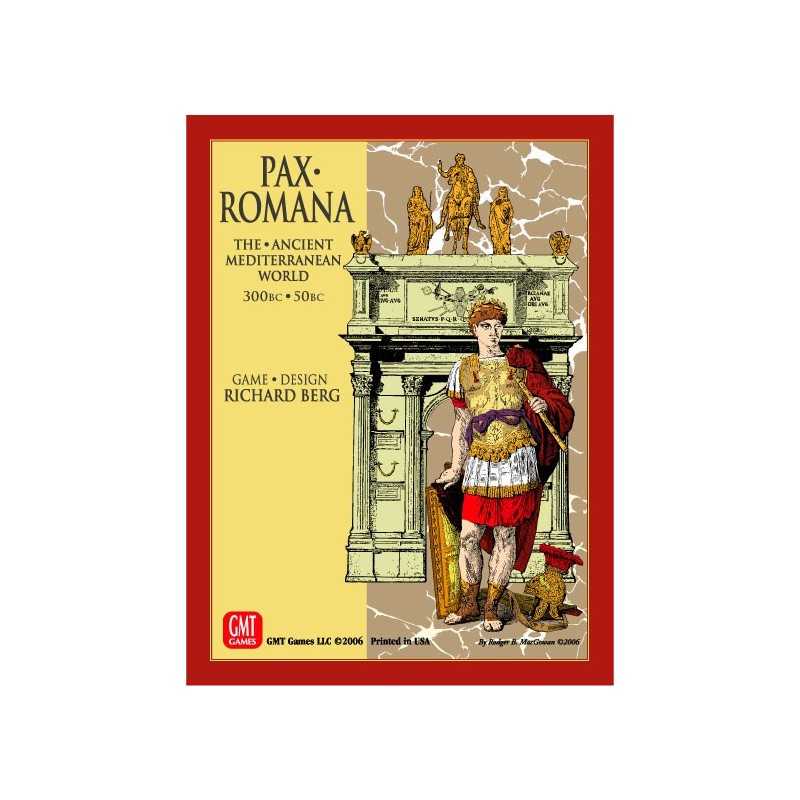- -10%







Second edition. How did Rome get to be Rome? Why did the Glory That Was Greece fade? What stopped Carthage from making an empire of the Mediterranean? Could the Seleucids really have conquered the western world?
Out-of-Stock
 ¿Enfundamos tus cartas?
¿Enfundamos tus cartas? Game description
Game descriptionSecond edition. How did Rome get to be Rome? Why did the Glory That Was Greece fade? What stopped Carthage from making an empire of the Mediterranean? Could the Seleucids really have conquered the western world?
These are a few of the questions you can explore in the exciting new GMT game, PAX ROMANA, designed for play by all levels of gamers, from the competition-oriented, one sitting players to the Let’s Recreate History on a grand scale aficionados.
PAX ROMANA covers the Europe from 300 BC through the end of the 1st century BC, when control of the Mediterranean was in a state of flux with four empires possible. And it does so with a scale and system that is filled with decision-making tension but also highly accessible and easy to play. The emphasis is on strategic operations, from raising armies to colonizing outlying areas, to fighting barbarian incursions, to maintaining political stability at home.
PAX uses a unique marker-oriented play sequence that provides surprise and opportunity, plus a deck of unusual cards that provide the historical background of events and calamities within which the players must operate.
Each turn represents 25 years, with the movement of forces and the shifting of power occurring at a proportionately very large scale. Combat takes place throughout the game, but they, too, represent ongoing conflict as much as individual battles. But even here, subtleties are built-in: force composition matters – armies overbalanced by cheap light infantry suffer penalties, while cavalry can single-handedly make the difference between winning and losing – and knowing when and where to make a stand and when to withdraw to safer places can literally decide the fate of a power for an entire generation.
And at this scale, of course, the best-laid plans frequently go awry. In one playtest, Rome was all ready to sail for Sicily when suddenly an army of Gallic barbarians appeared with the play of a card and swept across northern Italy and down towards Rome. In another, the two leaders for The East (representing the Seleucids and the Ptolemies) joined together for a knock-out blow against the Greeks in Asia Minor, when the play of a different card had the leaders turning on each other, destroying over half their forces, and putting The East on the defensive for the remainder of the turn. In still another, the Greek player drew a card that he was forced to play on himself, causing civil war in his homeland and giving his enemies not only a breather, but a surprisingly easy advance.
Most important for gamers, though, is the wide variety of scenarios PAX provides, from fast-playing, one-sitting two-player games to vivid recreations of the entire era with four players. The game works well with 2, 3 or 4 players, and is designed to be playable solitaire for those interested in the historical view it provides. Scenarios range from The Punic Wars, through the Eastern Med conflicts between the Greeks and the Seleucids, all the way up to the entire 10 turn game, covering 300 years of history. In addition, there are two versions of PAX: the Standard Game, designed for fast play, and the Advanced version, which adds in much tangential history and allows for a more introspective examination of the era.
Designed by Ancients simulation expert, Richard Berg, and staunchly developed by Neil Randall, PAX ROMANA includes one beautiful gamemap (see the attached example of just the playtest version), 55 cards, 400+ counters, and a host of play aids and charts to keep things organized.
 Reviews
Reviews
@CUSTOMER_NAME@
@AUTHOR_PROFILE@ @COMMENT_ISO_COUNTRY@ @VERIFY_PURCHASE@@COMMENT_TITLE@
@COMMENT_COMMENT@